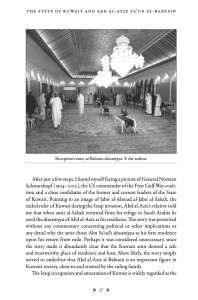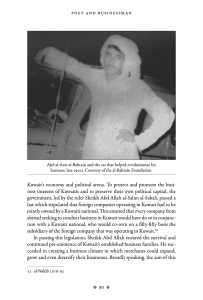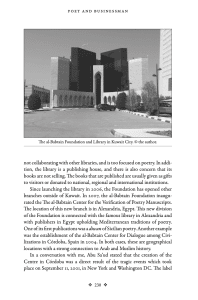Working to improve mutual understanding between the Middle East and the West
Working to improve mutual understanding between the Middle East and the West
No products in the basket.
This book reviews and analyses the modern history of Kuwait by telling the story of Abd al-Aziz Sa‘ud al-Babtain (b. 1936), a businessman, philanthropist, and poet whose own story closely interweaves with the history of the state.
‘Poet and Businessman’ takes a uniquely wide-ranging view of this history and is a rare study of an individual from a generation in the Gulf who witnessed firsthand the discovery of oil and experienced the many benefits it brought. It was this discovery, which also came with societal costs and challenges, that has played a crucial part in the socio-economic and cultural development of Kuwait and the wider Gulf region. By constructing an overview of the modern history of Kuwait in parallel with the life of Abd al-Aziz Sa‘ud al-Babtain, Stenberg succeeds in filling a lacuna in contemporary scholarship on the Middle East, especially on a neglected area of Arabian history.
The result is a balanced account of the state of Kuwait enriched by the story of a remarkable and influential individual.
Leif Stenberg is the Dean of the Aga Khan University Institute for the Study of Muslim Civilisations (AKU-ISMC). He is also a professor at AKU-ISMC and in the Faculty of Arts and Sciences. From 2007 to 2017, he was the founding Director of the Centre for Middle Eastern Studies at Lund University, Sweden. Between 2010 and 2019, Professor Stenberg was the president of the Nordic Society of Middle Eastern Studies. Among his publications are The Islamization of Science. Four Muslim Positions Making an Islamic Modernity, 1996, Schaebler & Leif Stenberg (eds.), Globalization and Muslim World: Culture, Religion, and Modernity, 2004, Hooglund, Eric & Leif Stenberg (eds), Navigating Contemporary Iran. Challenging Economic, Social and Political Perceptions, 2012, Salamandra, Christa & Leif Stenberg (eds), Syria from Reform to Revolt Vol. II: Culture, Society and Religion, 2015, and Leif Stenberg and Philip Wood (eds), What is Islamic Studies? European and North American Approaches to a Contested Field, 2022.
Acknowledgements
1. THE STATE OF KUWAIT AND ABD AL-AZIZ SA‘UD AL-BABTAIN
Abd al-Aziz al-Babtain: businessman and poet
Introducing Kuwait, the life of al-Babtain and the al-Babtain Foundation
The Iraqi invasion of Kuwait and identity insecurity
The National Assembly and the politics of citizenship:
gender, statelessness and tribal traditions
A second war in the Gulf 24 Studying Kuwait and Abd al-Aziz al-Babtain
2. ARABS, TRIBES, THE DESERT AND OIL:
ACKGROUND AND KEY THEMES
The notion of being Arab
Tribal history and the founding of Kuwait
Escape from the Najd
Desert, depression and downturn
The game-changing discovery of oil: the opportunity for entrepreneurship
3. SETTING THE SCENE: THE FOUNDING OF MODERN KUWAIT
Early years of the oil industry: political and economic changes
Property, the State, Islam and Arabism
The emergence of the State of Kuwait: from Sheikh Mubarak to Sheikh Abd Allah
Transformed by wealth: changes for government and citizens alike
4. KUWAIT ON THE WAY UP: THE WORLD OF AL-BABTAIN
A fertile business environment
The financial services rush
A society in flux: citizenship laws, limitations, difference and identity
A loss of heritage? Kuwaiti culture and the diwaniya
Crafting Kuwaiti citizens: the rise of a welfare state for nationals
Developing healthcare
From local to global media
Education: schooling modern Kuwaitis
5. KUWAIT EXPERIENCING CHALLENGES: THE SUCCESS OF AL-BABTAIN
1960s boom and 1970s chaos: the desire to diversify and industrialize
Speculation and Kuwait’s nouveau riche
Crash and aftermath
War in the Gulf
A state on its knees, and an exodus
The international community and an end to the war
6. CONTEMPORARY KUWAIT AND THE AL-BABTAIN FOUNDATION
Developments after the liberation of Kuwait
Economic recovery after the Gulf wars
Striving to become a major financial centre
The al-Babtain Foundation: aid programmes and foreign policy
Kuwaiti politics and uprisings in the Middle East
Politics, Islamists and the quest for democratization
Demography and Kuwait’s migrant workers
Women in Kuwaiti society: political participation
7. ABD AL-AZIZ AL-BABTAIN: THINKING ABOUT
A LIFE OF CONTINUITY AND CHANGE
Abd al-Aziz, Kuwait and the first scholarships
Expanding the al-Babtain Foundation
The library, changing ambitions and the “dialogue among civilizations”
The al-Babtain Foundation and the media
Promoting a culture of peace and influencing new generations
Poetry, Arab culture, Islam, identity politics and nationalism
8. FINAL REFLECTIONS
KUWAIT TIMELINE
BIBLIOGRAPHY
INDEX
1
THE STATE OF KUWAIT AND ABD AL-AZIZ SA‘UD AL-BABTAIN
One evening in November 1977, a hunting party led by Abd al-Aziz Sa‘ud al- Babtain1 pitched its tents between the cities of Ali al-Gharbi and al-Amarah in the south of Iraq. They were not far from the border between Iraq and Iran, alongside one of the roads that run north from the city of Basra towards Baghdad. The party was out hunting with falcons.
After a night’s sleep, in the early morning just before sunrise, a black Mercedes approached the camp. Abd al-Aziz and some of his friends walked towards the car intending to welcome the driver as their guest, offer him breakfast and enquire who he was and why he was coming this way.
A man rolled down the window and requested their permission to address them. He then asked who they were and if they had a hunting licence. The men responded that they were Kuwaitis and had a licence to hunt in the name of Abu Sa‘ud. The man in the car asked if Abd al-Aziz al- Babtain was among them.
“I am Abd al-Aziz”, replied Abu Sa‘ud.
The man then asked if they would accept a guest.
“We are Arabs like you”, was the reply from Abd al-Aziz, signalling his
assent.
The man in the car replied that the invitation for breakfast was not for him. He switched on the car’s headlights, to reveal to all those watching that a white Mercedes was approaching the camp. The car came to a stop and a handsome man got out. He struck a casual note, declaring that he was lucky – explaining that, when the leadership of the state of Iraq had summoned him back to Baghdad from Basra, it had been too early for the hotel he’d been staying in to prepare him breakfast. He said he was hungry and that he had noticed breakfast being prepared at the camp. “Those birds I see cooking look like a great meal”, he added.
After they had eaten breakfast, Abd al-Aziz asked his guest, “Who are you?”
“I am Adnan Khayr Allah al-Talfah, Saddam Hussein’s brother-in-law and cousin”, came the reply. The Iraqi leader at the time, Saddam Hussein, (1937–2006) had recently married the guest’s sister, Sajida al-Talfah.
With a poet’s curiosity and respect, Abd al-Aziz asked the guest if his father was the former mayor of Baghdad, a man who was also the author of 50 books. Adnan replied that he was. The discussion continued and Abd al-Aziz asked his guest about his work. He answered that he had been made a minister of the State of Iraq (Wazir al-dawla) 20 days before, but also that he was trained to lead the parliament of Iraq (Majlis al-Wuzara’). Subsequently, following this meeting, he was also appointed as the minister of defence.
As their conversation drew to a close, Adnan invited his host to join him for dinner in Baghdad. Abd al-Aziz accepted the invitation and drove to the capital of the Republic of Iraq later that same day.
At dinner, the host and his guest were engaged in friendly chat when Adnan suddenly changed tone and made a formal announcement to the Kuwaiti businessman and poet.
“Since you are linked to the leadership of the state of Kuwait, I am giving you a message to convey to the Kuwaitis”, he said.
“So, what is the message?” was Abd al-Aziz’s courteous and cautious reply.
“We, the Iraqi leadership, strive to abolish borders between Arab countries”, said Adnan Khayr Allah al-Talfah.
He continued in this vein, emphasizing that there was one Arab people and one Arab nation (umma) – ideas that reflected the rhetoric of the Iraqi Ba‘ath Party.
“We don’t need borders and barriers between us as Arabs”, Adnan concluded, looking pointedly at Abd al-Aziz.
“But there is a border between your country Iraq and the Kingdom of Saudi Arabia”, the Kuwaiti businessman and poet pointed out. “Moreover”, he went on, “there’s even a border between you and Syria, and you claim to
be of the same political party, the Hizb al-Ba‘ath (the Ba‘ath Party).2 Adnan, what you say reminds me of the chicken of Abu al-Ala al-Ma‘arri: You make it weak, you kill it and then you eat it!”3
Adnan gave him a hard stare across the dinner table. “We don’t make anyone weak, and we don’t kill them! Look, there is an American, Iranian, and Israeli conspiracy to create a sectarian belt from Lebanon to Tehran.” Adnan then told Abd al-Aziz that the minister of defence of Saudi Arabia had recently visited Baghdad and confirmed this conspiracy. “Do you trust Prince Sultan?”4 he asked Abu Sa‘ud. He said that he considered the Shah of Iran a secular man with no interest in religion and sectarianism – a man who aspires to make Iran the sixth strongest country in the world and also the “policeman” of the Gulf. “If the Shah does not comply with the Ameri- can-Israeli guidelines, they will replace him with religious leaders”, declared Adnan darkly.
1 This is the full name of Abd al-Aziz al-Babtain. He is also called Abu Sa‘ud in accordance with the tradition of being called the father (Abu) of his first son, who was named Sa‘ud.
2 For an overview of the relation between Iraq and Syria and the two Ba‘ath parties, see Lawson 1996: 98–128 and Devlin 1991.
3 Abu al-Ala al-Ma‘arri (d. 1057) is a celebrated Arab poet from Syria, who also
spent some time in Baghdad during his lifetime. He is well known for his critical and sarcastic views on religions in general. He was also renowned for his contention that reason is the primary source in the search for truth. Many people see him as one of the first famous atheists in Muslim history. A statue of him in his hometown of Marrat al-Numan in Syria was decapitated by jihadists from the al-Nusra Front in early 2013. For a short introduction to his life, see Smoor 2006: 6f, and for the beheading of the statue, see http://www.bbc.co.uk/news/magazine-35745962. Accessed August 24, 2017. 4 Prince Sultan bin Abd al-Aziz Al Sa‘ud later became the second deputy prime minister in 1982 and in 2005 he was appointed as the crown prince. He died in 2011.



‘Poet and Businessman provides a wonderful insight into the tremendous change that has gripped the Gulf region, and Kuwait in particular, over the past 70 years. The book is an invaluable contribution to our understanding of the political and social changes in a country that only became independent in 1961. A significant addition to the existing literature.’
–Dr Christian Koch, Director of Research, Gulf Research Center
‘Stenberg offers an illuminating lens on the history of modern Kuwait in the life of the founder of one of the country’s most successful and influential family-owned holding companies. A resourceful entrepreneur and a keen advocate of Arabic poetry and culture, al-Babtain is older than Kuwait itself and his story exemplifies the role his generation of business magnates and philanthropists have had on the country’s path to a national identity and economic prosperity.’
–Lisa Anderson, School of International and Public Affairs, Columbia University
‘This is an engaging and illuminating work on a period of history in the Gulf region that remains overlooked. A key aspect of Stenberg’s discussion is an analysis of Kuwait’s post-invasion transformations, shedding light on the hopes and struggles of its leadership and its people, citizens and residents, women and men. Al-Babtain’s career captures nuances of, and relationships between,Islam, Arabism, capitalism and culture, both state and popular.’
–Dr Amal Ghazal, Doha Institute for Graduate Studies and Simon Fraser University
Our work relies on the generous support of our donors. Any contribution, no matter how small, helps us achieve our aims.